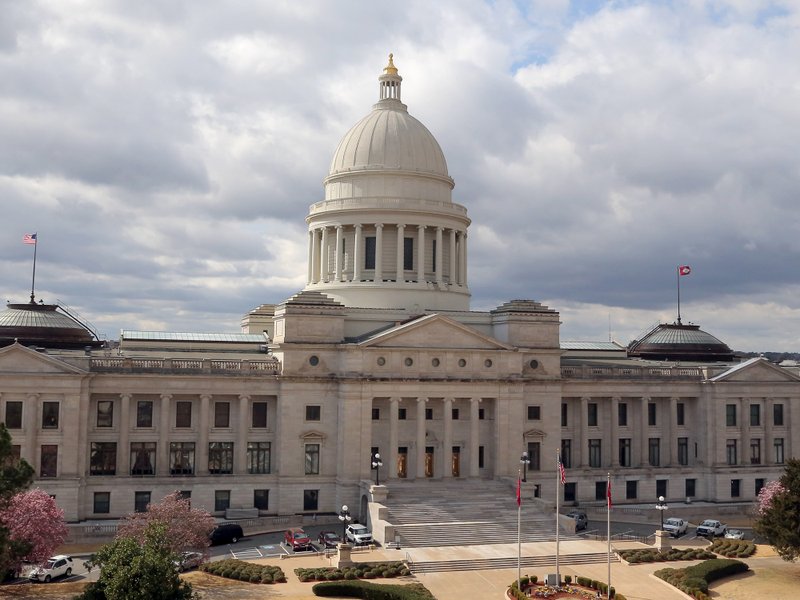A legislative panel on Tuesday signed off on granting $77.2 million in spending authority for the state Department of Education to disburse the federal American Rescue Plan's Elementary and Secondary Schools Emergency Relief Fund funds to 40 school districts.
The Legislative Council's Performance Evaluation and Expenditure Review Subcommittee authorized the spending authority without asking any questions.
The spending authority of the federal funds authorized by the panel Tuesday is the fourth tranche of funds it has reviewed since the Legislative Council rescinded $500 million in spending authority from the Arkansas Department of Education in July as part of its push for school districts to use the money on bonuses for teacher retention before it voted to grant back $42 million of that spending authority.
The three previous tranches of spending authority authorized by the panel total more than $456 million.
The funds are a part of the more than $1 billion in federal funding the state received from the Elementary and Secondary Schools Emergency Relief (ESSER) Fund to support schools during the covid-19 pandemic. The ESSER funds are a part of the American Rescue Plan Act approved by Congress and signed by President Biden in March 2021.
Subcommittee co-chairman Sen. Jonathan Dismang, R-Searcy, said Tuesday that 10 of the school districts seeking more of their allocations of the federal funds have current plans that meet the Legislative Council's recommendation that the funds be used to give a $5,000 bonus to full-time teachers, a $2,500 bonus to full-time classified staff, and a bonus to part-time classified staff in amounts that are half of those awarded their full-time counterparts.
Eight other districts seeking more of their allocations of the federal funds revised their plans to meet the Legislative Council's recommendation, he said.
Twenty-six other school districts seeking more of their allocations of federal funds have plans that don't meet the Legislative Council's recommendation and provided a justification for not meeting the council's recommendation, Dismang said.
The 10 school districts with current plans that meet the Legislative Council's recommendation include the Bearden, Buffalo Island Central, Cedarville, Clinton, Corning, Nashville, Omaha, Palestine-Wheatley, Riverside and Van Buren districts, according to state records.
The eight districts that revised their plans to meet the Legislative Council's recommendation include the Des Arc, Flippin, Heber Springs, Hope, Jessieville, Ouachita River, Stuttgart and Viola districts.
The 26 districts with plans that didn't meet the Legislative Council's recommendation include Alma, Arkansas School for the Deaf, Augusta, Bergman, Booneville, Charleston, Clarendon, Cleveland County, County Line, Crossett, Dermott, Dover, East End, Founders Classical Academy of Arkansas, Gravette, Guy-Perkins, Magazine, McGehee, Melbourne, Mineral Springs, Mount Ida, Nemo Vista, Newport, Rose Bud, Scranton and Star City districts, according to state records.
School districts cited a myriad of reasons for not meeting the Legislative Council's recommendation for bonuses.
The Clarendon School District said 20% of its American Rescue Plan ESSER allocation is devoted to learning loss as required by federal guidelines, and the remaining funds are encumbered with warm, safe and dry school facility projects such as heating, ventilation and air conditioning replacements and upgrades to increase air circulation and quality at both campuses and plans for building expansion at Clarendon High School.
The Dover School District said it has prior projects either completed or allocated as outlined in its plan and the district has provided additional compensation to its staff over the past two years. Staff received about $1,900 in additional pay in 2020-2021 and about $1,500 in additional pay in 2021-2022, the district said, and the district plans to use its remaining money to provide $3,500 of additional pay to all staff, the district said.
The Rose Bud District said it has already paid $314,949.30 to its staff out of ESSER funds for covid hazard pay and the district will use $154,980 to give an additional $1,000 bonus in the fall of 2022.
The purpose of the American Rescue Plan Elementary and Secondary Schools Emergency Relief Funds is to help state education agencies and local school districts to safely reopen and sustain safe operations of schools and to address the academic, social, emotional and mental health impacts of the coronavirus pandemic on the nation's students, according to the state Department of Education.
Under federal law, the state Department of Education may not direct how school districts choose to use these federal funds, but will assist school districts as needed to develop plans and priorities, department Secretary Johnny Key has said.
The Department of Education may not reimburse districts for American Rescue Plan ESSER expenses until the department's appropriation request has been approved by the subcommittee, according to Key.
CORRECTION: The American Rescue Plan Act was signed by President Biden in March 2021. An earlier version of this story incorrectly named who signed the law.

